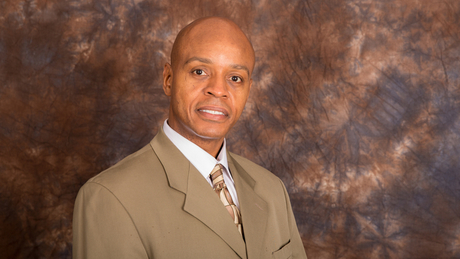Director and Title IX Coordinator in the Office of Diversity & Inclusion Rory Muhammad celebrated his first 100 days at the George Washington University this past month. Since joining GW in November, Muhammad has taken on a host of duties, meeting with students, faculty and staff almost every single day to help create a safe and equitable campus community.
How does one become a university’s Title IX coordinator? In Muhammad’s case, it starts with studying industrial and organizational psychology, or the scientific study of human behavior in the workplace and determining how to improve the workforce based on psychological systems and theories.
Muhammad says that study spawned an interest in human resources and learning about cultural diversity and differences. From there, he became intrigued—and unsettled—by the subtle and not-so-subtle inequities common in the workplace.
“Once I got into that work, then I began to see ‘OK, there needs to be some sort of foundational groundwork laid in which everybody is at least given the same rights.’” Muhammad said. ”That grew into my getting more information about equal employment opportunity, anti-discrimination, and anti-harassment efforts designed to ensure that the playing field is as equitable as possible. I familiarized myself with the laws in place that make sure non-voluntary measures are in place, that require certain things be done or avoided in order for individuals to be treated with some semblance of equality.”
With that focus on harassment came an even more targeted focus on sexual harassment. Now devoting most of his work to Title IX-related issues, as he did at George Mason University for nine years prior to landing at GW, Muhammad hopes to continue cultivating spaces where people are given the same rights, are protected and know how to confront instances of sexual misconduct.
“I would like to give some clarity to the community around the processes that all constituents have at their disposal when these issues surface; whenever there’s an allegation or an event that falls into the category of sexual assault or sexual misconduct,” he said. “Questions like, ‘Who do I go to if I’m a student? Faculty member? Or staff member?” In the long-term, I want us to take steps so that this and other critical information is accessible and crystal clear.”
In his first 100 days, Muhammad has met with staff in the Office of General Counsel, University Human Resources, GW Police, the Division of Students Affairs, particularly Student Rights and Responsibilities, GW Housing and the CARE Network, in addition to student groups such as Students Against Sexual Assault, to identify and implement the best strategies for preventing and handling sexual misconduct, in addition to monitoring the university’s overall Title IX compliance. One of his main priorities now is to harness existing efforts around training students and adding to those efforts. He says, despite some concerns, adding online training to the mix is essential.
“If you have 24,000 students, you can do all of the in-person training you want, you aren’t going to reach everybody,” Muhammad said. “You have to have a good tool out there, and then have one that’s geared toward students, and one geared toward faculty and staff—in some cases there will be differences between what is offered to faculty and staff. So that’s what I’m working on now:”
Eventually, Muhammad hopes the university sees his office as “a one-stop shop of resources” related to Title IX and related matters involving sexual misconduct. Moving into the next phase of his work at GW, he says he’s excited to be a change agent focused on creating and sustaining a community where people feel like they can wholly participate and bring their whole selves to their academic or employment environment. He also noted the added bonus of working alongside an engaged student body.
“Every community is different. At the university I came from, there wasn’t nearly as much exposure or media focus, and not nearly as much student involvement,” he said. “The student energy here is off the charts.”


